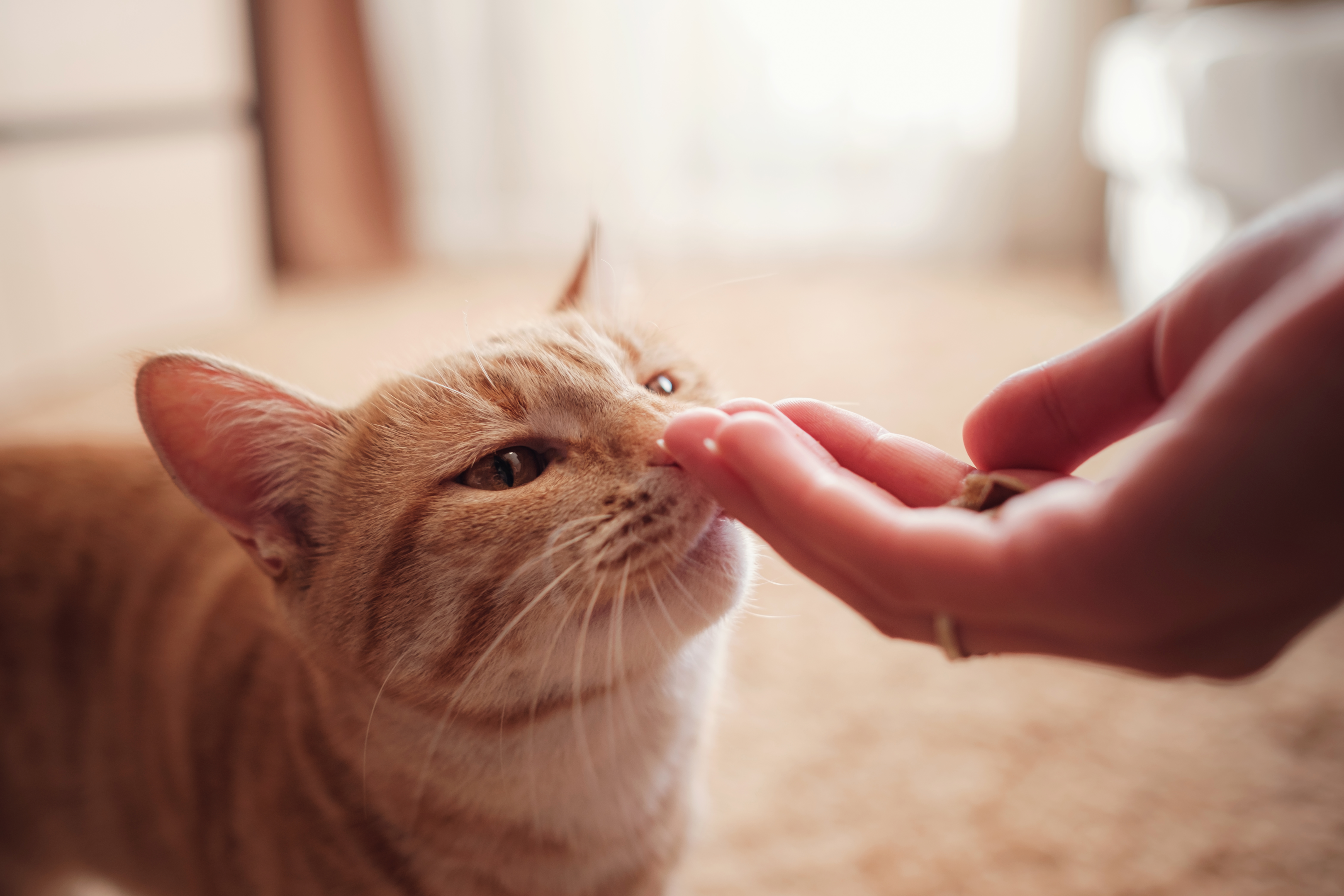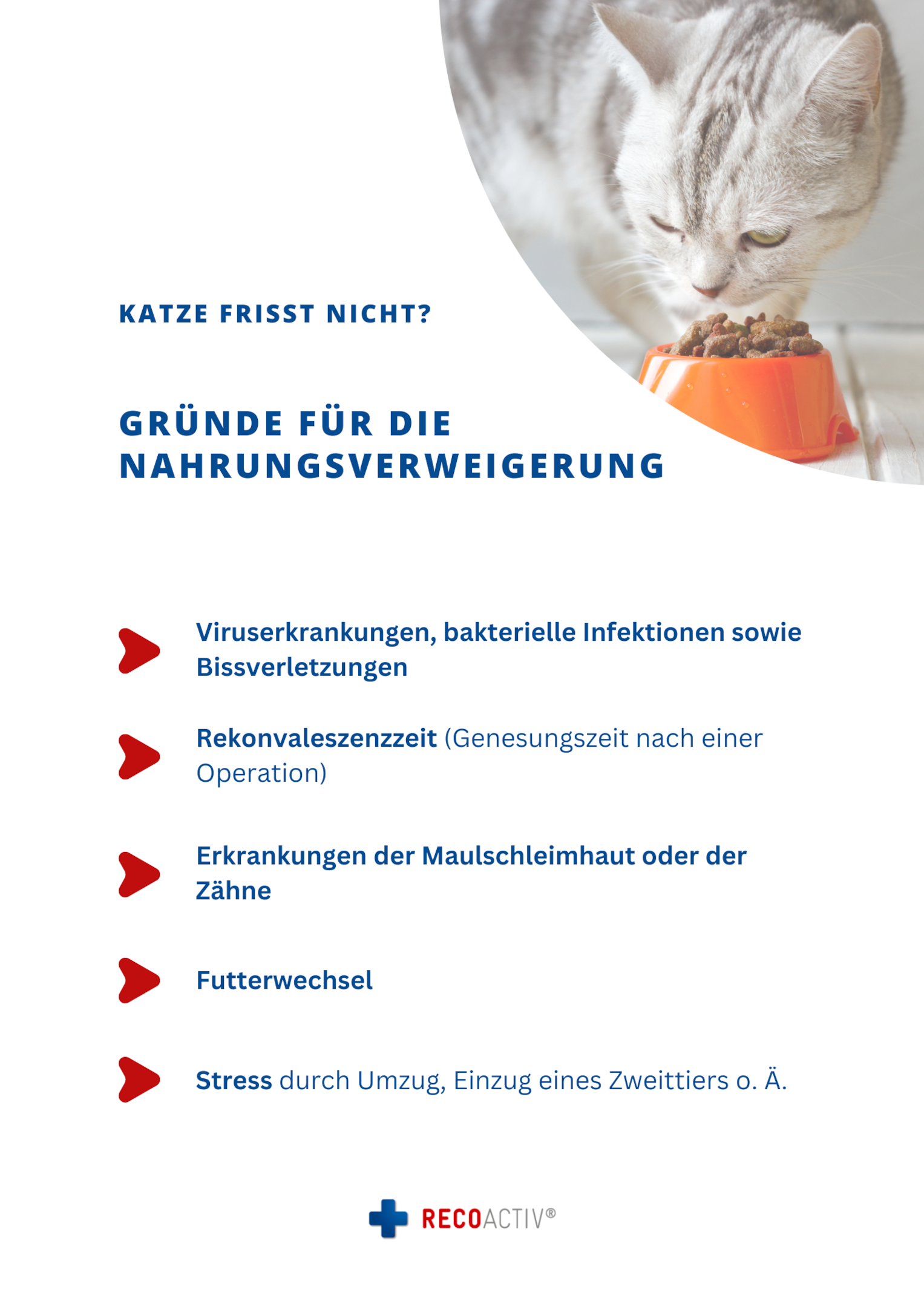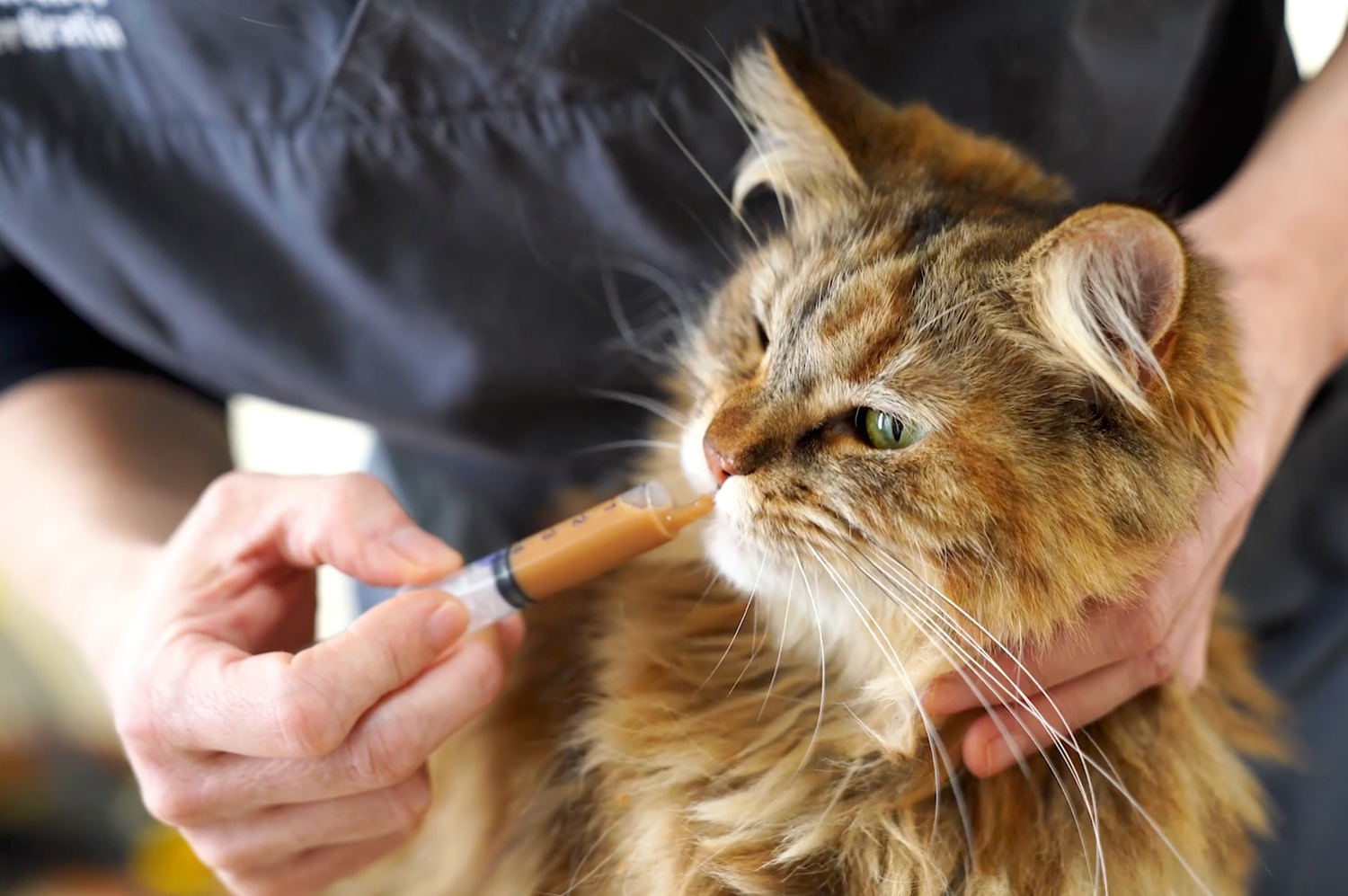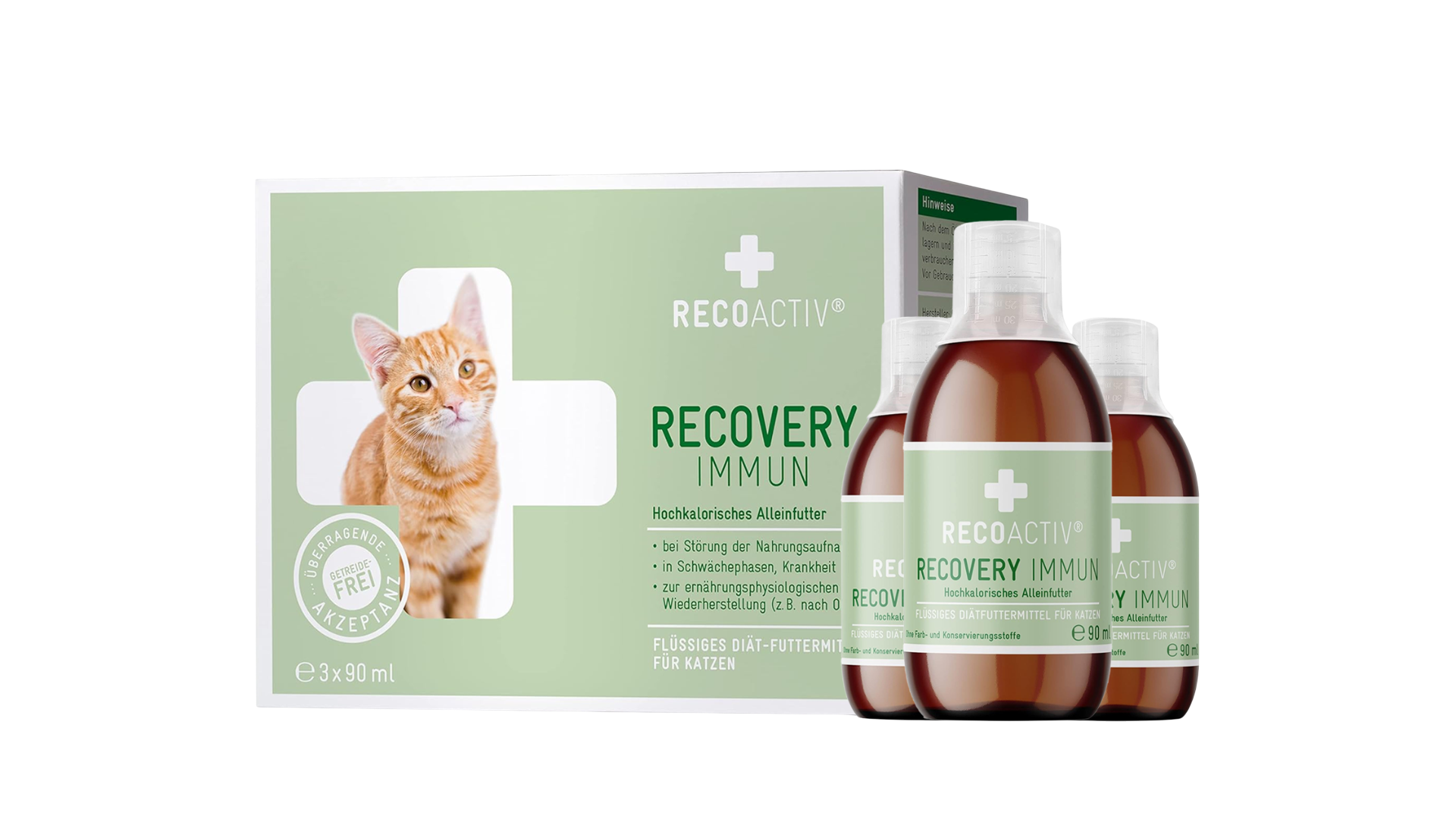Why do cats suddenly refuse to eat?
If cats don't want to eat, it's not necessarily cause for concern. However, it's important to observe them closely. If a cat doesn't eat for more than 24 hours, it can be harmful to its internal organs. Now it's important to investigate the reason for the refusal to eat.
Is the cat perhaps dissatisfied with the food provided? Is she in pain or experiencing stomach problems?
Whether there are serious underlying causes for the loss of appetite can ultimately only be determined at a veterinary practice. Veterinarians have completely different resources and the necessary expertise to examine the animals thoroughly.
In this article, we will discuss possible causes for food refusal in cats and explain what can be done in such cases.

Why do cats suddenly refuse to eat?
Refusal to eat in cats can be triggered by inconspicuous reasons such as a change in food recipe, negative feeding experiences, or even minor things in the environment.
Cats often present their owners with seemingly insurmountable feeding problems because, for unexplained reasons, they stop eating the food they previously enjoyed . Even if nothing has changed in the cat's lifestyle, as far as the owner is concerned, sometimes it's small things that deter the cat from eating.
Possible reasons for this could be changes in the recipe or consistency of the food, or even a negative experience related to feeding . All of these factors can contribute to cats suddenly stopping eating their usual food.
Many cat owners trust that their pet will start eating again after a short time, but: the longer the cat refuses food, the less likely it is that the animal will return to the food bowl.
What are the possible causes of food refusal in cats?
The causes are varied and range from acute illnesses (fever, bacterial infections) and dental problems to changes in diet and stress, as well as psychological strain or care outside the home.
The causes for poor food intake or even food refusal can be very diverse:
- Illness accompanied by fever and weakness (bite injuries, viral diseases, bacterial infections)
- Surgery and the recovery period
- Diseases of the oral mucosa or teeth (enamel defects (flor), eosinophilic granuloma complex, gingivitis)
- Change of feed
- Stress (e.g. due to moving house, changes in family circumstances, care by strangers, moving in of a second pet)

Is the cat eating elsewhere, or has it eaten its fill?
Yes, outdoor cats often eat less at home because they have eaten their fill elsewhere (e.g., at the neighbor's food bowl) or have provided for themselves with captured mice and birds.
Your cat isn't eating ? If your cat is an outdoor cat, the reason for refusing food at home could be quite simple: perhaps it has simply eaten its fill elsewhere . This is especially likely if there are other cats in the neighborhood. Sometimes, it's just too tempting for a cat to nibble from another cat's food bowl. And occasionally, food tastes better when it's unfamiliar.
It's also possible that the cat is hunting mice and birds for itself, and its hunger is already satisfied. In the cases described , changing the food or offering more variety can be helpful.
With indoor cats, it's much easier to control what they eat throughout the day. If a cat suddenly refuses its (main) food, you should consider whether it might be getting too many treats in between meals . Snacks should never replace a cat's main food, because only the main food contains all the essential nutrients a cat needs to live a healthy life.
Is the problem with the food itself?
Yes, the problem often lies with the food, if it lacks freshness (especially in hot weather), the type is unfamiliar, the food is spoiled, the consistency is not to the liking, or there is oversaturation due to daily repetition.
If there is something wrong with the cat's food, she will most likely refuse it as well. These could be the reasons:
- Lack of freshness: Especially in high temperatures, moist cat food can quickly lose its freshness. Cats are sensitive animals and often notice this by smell alone.
- Unfamiliar, new food: Has the brand of food been changed, or has the manufacturer altered the recipe? In this case, cats often initially react with resistance. If you want to deliberately change the food, you should do so slowly and gradually. A good approach, for example, is to mix a little of the new food into the cat's usual food each day. Later, you can replace it completely.
- Spoiled food: It's certainly understandable that a cat won't touch spoiled food. Cats instinctively know that eating it wouldn't be good for them.
- Unfamiliar consistency: Moist cat food can vary in consistency. Some cats prefer chunks, others a creamy texture. If the consistency of a food is unfamiliar to the cat, it will likely reject it initially or at least regard it with suspicion.
- Overfeeding: Eating the same food every day? That can quickly become boring for cats. While they are creatures of habit and generally dislike drastic changes, a little variety now and then is perfectly fine. It's not advisable to serve your cat the same type of meat every day – she might eventually get tired of it.
Could a food intolerance be the cause?
Yes, often the refusal to eat is due to a food intolerance or allergy to certain protein sources (e.g. beef, poultry) or grains, which leads to discomfort and the instinctive rejection of food.
Often, a cat's refusal to eat is due to a food intolerance . Like humans, cats can be sensitive or even allergic to certain ingredients. In many cases, intolerances occur with specific protein sources found in cat food. The cat may not tolerate certain types of meat, such as beef or poultry ; in addition, intolerances to various grains are possible.
If the cat cannot digest these proteins, it often experiences discomfort, vomiting, and diarrhea. It will then automatically avoid the food, as it doesn't want to experience the symptoms again. Therefore, it's important to find the cause of the intolerance and stop feeding it food containing that protein source.
Cats with generally sensitive stomachs can benefit from sensitive food . However, it is always advisable to have them examined by a veterinarian to determine the cause of the intolerance. Only then can a sensible change in diet be made.
Do dental problems cause loss of appetite?
Yes, common causes of reduced appetite include dental problems such as missing teeth, tooth loss, inflammation, or tartar, as these cause pain and make chewing difficult.
Cats often suffer from dental problems, which can also affect the gums. Missing teeth, teething, inflammation, or tartar are frequently the cause of these issues. These problems, in turn, can lead to a reduced appetite in cats. If you suspect your cat has a dental problem, you should take it to a veterinarian.
Feeding additional dry food is beneficial because chewing helps to remove tartar from the teeth.
What influence do age and senility have on eating behavior?
In older cats, chronic illnesses (kidney failure, cardiovascular or liver disease) often lead to a decreased appetite. Additionally, a decline in their sense of smell can mean that the cat simply can no longer smell its food and therefore has no appetite.
Older cats often suffer from various illnesses such as chronic kidney disease , cardiovascular disease, or liver disease . A decreased appetite is usually among the symptoms in all cases. For this reason, it is important to have older cats examined by a veterinarian frequently. The earlier an illness is detected, the better it can be treated with medication and a specific diet .
However, older cats often experience a decline in their senses, such as their sense of smell . In such cases, the cat may simply lack appetite because it cannot smell its food.
Can organic diseases trigger food refusal?
Yes, serious organic diseases such as inflammation of the stomach/intestines, metabolic disorders (kidney, gallbladder, liver diseases) or tumors are possible reasons for food refusal.
However, even younger cats can suffer from serious illnesses that could be a reason for refusing food. For example, it is conceivable that a disease affecting certain organs is present.
Veterinarians can rule out various diseases using blood, urine, and stool samples . An ultrasound examination can also be used. If additional symptoms such as lethargy, nausea, or diarrhea occur, prompt action is required.
These diseases can cause a cat to suddenly stop eating:
- Inflammation of the stomach or stomach lining, as well as inflammation of the intestines or pancreas.
- Metabolic disorders such as kidney, gallbladder and liver diseases
- Tumors
Are infections or parasites a cause of loss of appetite?
Yes, infections caused by viruses, bacteria or parasites (such as worms) are a common cause of food refusal, as they are accompanied by symptoms such as fever, exhaustion, digestive problems and impaired sense of smell.
When a cat's immune system is fighting an infection, this is a common cause of loss of appetite. Infections are caused by viruses , bacteria, or parasites and are sometimes accompanied by symptoms of a cold or flu. These include:
- exhaustion
- Fever
- apathy
- Intense thirst
- Impaired sense of taste and smell
- Loss of appetite
- Anorexia (weight loss)
A certain degree of discomfort often occurs in connection with a parasitic infestation , for example by worms. This can be one reason why the cat then stops eating properly.
Can psychological stress lead to refusal to eat?
Yes, cats are sensitive animals that can react to psychological stress (moving, noisy children, new animals), hormonal imbalance (heat, pregnancy), or the negative association of the feeding place with illness or medication intake by refusing food.
Cats are generally sensitive animals that can sometimes suffer from psychological stress. What a cat perceives as stressful can vary greatly. For example, a change in diet might be stressful for them. It's equally possible that a cat might be frightened by noisy children or other animals in the household . Cats in heat, pregnant, or nursing often eat poorly because their hormones are out of balance.
These life circumstances can cause cats to feel stressed or psychologically burdened:
- Visits to the vet or surgeries
- Relocation
- Disorientation in an unfamiliar area
- Coexistence and conflicts with other animals
- Grief over the loss of a loved one or another animal
- Pregnancy and birth
In some cases, cats may even associate their food or feeding area with a negative experience. This can be due to illness or medication that the cat had to take along with its food. If such a behavioral pattern occurs, cat owners need a lot of love and patience . The animal must then be gently encouraged to eat again.
The best way to do this is to place her food bowl in a quiet place and give the cat loving attention .
What happens if the cat doesn't eat? (Metabolism)
Because a cat's body is designed to consume small portions several times a day, it must burn fat and muscle when food is withheld. If this condition persists for more than 38 hours, the disruption of fat metabolism leads to the development of fatty liver disease (hepatic lipidosis), which is life-threatening.
Cats are carnivores (meat-eaters) , meaning they depend on a diet consisting almost exclusively of meat. They require a large amount of protein for their metabolism and, in comparison, a very small amount of carbohydrates. If too many carbohydrates are ingested through their food, this can reduce protein digestibility (protein absorption).
Proteins are not only needed to maintain muscle mass and bodily functions , but they also help regulate blood sugar levels. Cats typically eat many small portions throughout the day (and night) and can easily bridge short periods of hunger .
Starvation metabolism begins after a period of food deprivation (refusal to eat) of 3 to 5 days, during which the body attempts to synthesize alternative energy sources by releasing fatty acids. However, this is only possible for a short time. Particularly in overweight cats, a large number of fatty acids are mobilized and accumulate in the liver. This often leads to hepatic lipidosis.
Should food refusal occur, immediate supplemental feeding with protein-rich food is necessary to ensure the supply of essential nutrients.
Treatment options and how can appetite be stimulated?
For acute treatment, wet food or liquid supplements are suitable (possibly administered via syringe or feeding tube). To stimulate appetite, feeding tricks can be used, such as serving strong-smelling treats (tuna), warming wet food, moistening dry food, or administering special nutritional supplements.
If cats are not eating, wet food or liquid supplements are a suitable option, as they are easier to ingest and require less effort to eat. If the animal is very weak, the food can be administered directly into the mouth using a syringe . If the cat is unable to swallow, high-calorie food can be given via a feeding tube .
This is how you can stimulate your appetite.
If a cat suddenly starts eating poorly or stops eating altogether, this should not be ignored. Instead, it's important to encourage the cat to eat. Our tips should help you do just that.
Diseases as possible causes should be ruled out first. If the cat is suffering from an illness, it must be treated by a veterinarian immediately!
Is your cat healthy but still eating poorly? Then the following tips are advisable:
- Serve treats: Sometimes, simply offering things that your cat really enjoys will do the trick. Tuna has a very strong smell, which often stimulates cats' appetites. It's not necessary to give her a whole tuna; you can also mix a little into her regular cat food. Special dietary supplements can also help stimulate a cat's appetite.
- Warming wet food: Briefly heating the food in the microwave makes it smell stronger afterwards. And a strong, pleasant food smell is known to stimulate a cat's appetite.
- Moisten dry food: Some cats find it more pleasant to chew the food this way.
- Small portions several times a day: It is in the nature of cats to eat several portions a day.
- Sprinkle dry food or snacks over wet food: However, you must keep an eye on your cat's daily needs. If you're also giving dry food, it's important to give less wet food.
The cat still doesn't want to eat? Don't give up just yet. Perhaps it's the location of the food bowl . Try moving it to a different spot that the cat might prefer.
When should I consult a veterinarian?
Due to the risk of fatty liver disease in overweight domestic cats, if a cat completely refuses food, you should not wait longer than 24 hours before visiting the veterinarian.
If a cat has a lot of fat reserves – as is the case with many domestic cats – it is at increased risk . Therefore, if a cat completely refuses food, you should not wait longer than 24 hours before visiting the vet.
Frequently Asked Questions (FAQ) about loss of appetite in cats
How long is it okay if a cat doesn't eat?
Cats that haven't eaten for more than 24 hours must be examined and treated immediately at a veterinary clinic. This is always an emergency.
What to do if your cat refuses to eat?
If your cat stops eating, you need to act quickly. If the cat is otherwise healthy, you can try various tricks to encourage it to eat. A good tip is to gradually switch to a different type of food. You should also check if the current food is still good or if your cat has any food intolerances.
How can I get my cat to eat again?
If your cat has been switched from wet to dry food, she may have some initial difficulty adjusting. In this case, you should moisten the dry food. Wet food, on the other hand, can be briefly warmed in the microwave to increase its aroma.
Conclusion
If a cat stops eating, it's always a sign that something is wrong. The cat should then be closely monitored. If other symptoms accompany the loss of appetite, this could indicate a serious illness. A visit to the veterinarian is then advisable. This also applies if the cat hasn't eaten for more than 24 hours.
If the animal is healthy but still refuses food, this shouldn't be ignored. The cause might lie with the food itself, and a change in diet may be necessary. Outdoor cats also often help themselves to the food bowls of neighboring cats. If there are no apparent reasons for a cat's disrupted eating habits, you can try moving its food bowl to a different location. It should be in a quiet spot and not directly next to the litter box.



